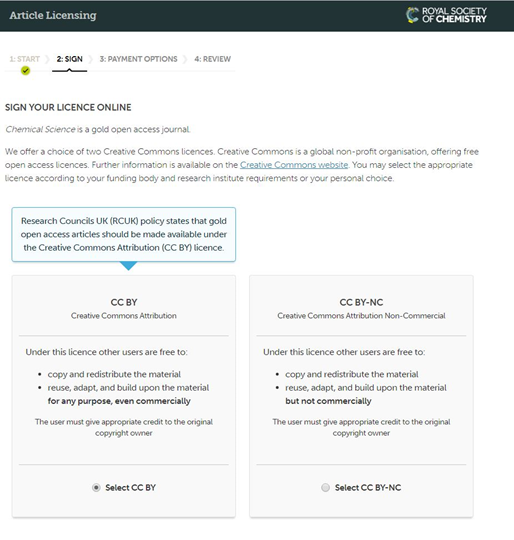The Royal Society of Chemistry
The Royal Society of Chemistry works to shape the future of the chemical sciences – for the benefit of science and humanity. With over 50,000 members, the Royal Society is the UK’s professional body for chemical scientists; supporting and representing members and bringing together scientists from all over the world. As a not-for-profit with more than 175 years of heritage and an ambitious international vision for the future, it promotes, supports and celebrates chemistry.The Royal Society of Chemistry’s international publishing business contains over one million articles, chapters and records from across the chemical sector and its global publishing arm produces 45 peer-reviewed, industry leading journals, 1,500 printed books and a collection of online databases and services.
Background
The OA landscape is changing rapidly, and the Royal Society of Chemistry wanted to improve and speed up the way it managed its OA processes and customer experience.
As a chemistry author, there are a number of different ways to make your research open access. The choice may be dictated by funder mandates, institutional agreements or author preference and lead to a number of different licencing and payment scenarios. Consequently the Royal Society of Chemistry found itself having to use time-intensive, manual work-arounds to cope with the increasing demand for OA articles.
Business challenge – How do we cope with the changing Open Access landscape?
The Royal Society of Chemistry brought in 67 Bricks to help them build a new, automated OA system that would be flexible and robust enough to grow alongside their Open Access programme, evolve with the changing landscape and support staff and external users simultaneously.
Building a new system
The Royal Society of Chemistry wanted to take a whole new approach to this IT project. Unlike most projects where they put the technology first and then worked in silos to deliver, this time they came together and put the author front and centre. The team asked questions like: What journey does the author need to take to manage their OA? How do they interact with the interface? What logical steps make life easier or harder for them? How can we make this simpler? Starting from this new perspective flipped everything.
The new system now handles all OA-related communications and transactions between authors and the Royal Society of Chemistry and delivers personalised recommendations to authors based on their funder, institution or country to help them understand their specific publishing requirements and then select the most suitable OA and licence option.
All authors start from the same landing page and select their publication route (green or gold OA), sign their publication licence, and pay their article processing charge (APC) – either themselves, delegating to a payee at their institution, requesting a waiver or via an automatically identified Read & Publish agreement. If an author isn’t sure of the best route for them, the system identifies the best option for them, given the information it holds on them.
67 Bricks also recommended extending the OA licencing system to non-OA licenses to avoid the Royal Society of Chemistry having to manage licences in two separate systems depending on whether or not they are OA, as well as to make the benefits of a fast and intuitive licence signing system felt by all authors.

Taking an agile approach
The Royal Society of Chemistry decided to work with 67 Bricks in an Agile way; building, testing and releasing different iterations of the new system, based on user feedback gathered ‘on the go’. User research was gathered in five external sessions allowing end-users to really shape the system into something that met their varying requirements. In addition to these formal research sessions, iterative releases meant that over 6500 real users had already used the system by the end of the project. This way of working was a learning curve for the Royal Society of Chemistry team. This is an industry where accuracy is precious and it took some time to trust that, in this instance, it was good to release, tweak and refine the final solution iteratively. However, once the team had been able to show their stakeholders some early efficiencies they soon won supporters. Honest, open, regular communications were also essential to keeping different stakeholders on board.
The results
The Royal Society of Chemistry quickly started to see results, even before the system was fully live. An increased number of users were taking articles seamlessly through the revamped OA process – without getting stuck or needing intervention – and they were doing it faster too. Before the new system, it often took authors 3 weeks to choose and sign a licence… this process is now down to 3 minutes.
As a result, the Royal Society of Chemistry now only need 0.3 staff members dedicated to managing OA as opposed to 2 people full time, and that time and energy saved is now spent on more critical tasks.
Overall, the new system has been extremely well received with authors reporting a more personalised, intuitive service where it is explicit which options are available to them and at what cost. The new system has also particularly improved the performance of, and integrated easily with, the Royal Society of Chemistry’s Read & Publish service.
Business value
Thanks to the new future-proof system, the Royal Society of Chemistry are now well positioned to support their ongoing OA strategy and extend their offering, plus far more ready to adapt to changing market demands and policies.
Key business wins
- Since 2005, the number of articles published OA has increased from 5 to 9000 per annum. The new system meets this demand and supports continued growth
- Staff time freed up to work on more business critical activities – 2 people’s full time effort on customer service reduced to 0.3
- Before the new system, it often took authors 3 weeks to sign a licence… it now takes 3 minutes
- A robust system that is easy to manage, extend and evolve and has integrated seamlessly with existing sales and publishing models
- A vastly overall improved author experience








